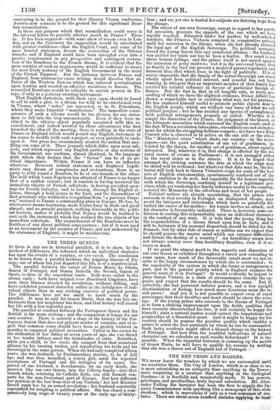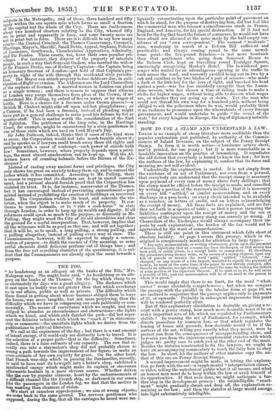THE RED CROSS AND DAGGER.
WE never know the wonders by which we are surrounded 'Until we scrutinize them. The City of London, whiehis so close to Us, is more astonishing as an antiquity than anything in the Tower ; more surprising as a creature than anything in the Zoological Gardens—it is fearfully' and wonderfully made. It has powers, privileges, and peculiarities, truly beyond calculation. Mr. Alex- ander Pulling the barrister has been the .first to snpply4he In- quiry Commissioners with anything like a monograph'of this civic creation ; which is marvellous if only as a vastemisumer of sta- tutes. There are about seven hundred statuteadapplying 44, load
subin the Metropolis ; and of these, three hundred and fifty jects
apply within the one square mile which forms so small a fraction of the capital but the whole of the City. There are furthermore about two hundred charters relating to the City, whereof fifty are in print and i
apparently in force, and some twenty more are i
not in print but in force. There are it is difficult to say how many courts —the Central Criminal, the Thames Conservancy, Coroner's, Hustings, Mayor's, Sheriff?, Small Debts, Appeal, Orphans, Policies of Insurance, Southwark, Chamberlains' Apprentices, Admiralty, and Pie Poudre. These courts, too, have their own peculiar pri- vileges. For instance, they dispose of the property of intestate people, in such a way that Sergeant Onslow, who married the widow of Sir Francis Drake, one of Itodney's Captains—the Captain being an honorary freeman of London—got hold of that Captain's pro- perty in right of the wife through this accidental civic jurisdic- tion. The Mayor can attach property before debts are due, in anti- cipation of flight or evasion. The Aldermen are the Lord Chancellors of the orphans of freemen. A married woman in London can plead as a single woman ; and there is reason to suppose that citizens of London may purge themselves from pleas of the Crown, if we understand Mr. Pulling, by ordeal of fire or water, or by wager of battle. Here is a chance for a freeman under Crown process !—a British M. Chabert might ride off upon red-hot ploughshares ; or a Cannon, if he had been a freeman, instead of pleading might have put in a general challenge to make good his defence by fist or quarter-staff. This is matter worth the consideration of the Earl of Eglinton. The gentlemen of the long robe, in the Hustings Court, for example, might be encountered by a civic gentleman in one of those suits which are used on Lord Mayor's Day.
Sir John Patteson, indeed, thinks that if cases of the kind were to occur, the Corporation would not take much trouble about it ; and he speaks as if lawyers could brush away those old rights and privileges with a sneer of contempt—such power of suicide hath law ! Sometimes, however, where property depends upon a privi- lege, the most absurd anachronism can be kept up. Will the Al- dermen leave off counting hobnails before the Barons of the Ex- chequer Instead of casting away ancient forms and privileges, the City only shows too great an anxiety to keep them up, and to conceal the lathes which it has committed. According to Mr. Pulling, there is reason to suppose that its charters are kept in sacred conceal- ment, lest a perusal should furnish proof that the Corporation has violated its trust. It is, for instance, conservator of the Thames, but it has encouraged instead of preventing encroachment—per- mitted instead of prohibiting the erection of buildings on recovered lands. The Corporation violates its trust, and conceals the vio- lation, when the object is to make much of its property. It con- tinues to count hobnails, or to " ride a cock-horse " in state through London, in order to keep up its wealth and dignity. If all reformers could speak as much to the purpose, as discreetly as Mr. Pulling, they might weed the City of its old absurdities and clear the ground for a useful incorporation. That, however, implies that all the witnesses will be as good as this one, and will act together ; that it will be, so to speak, a long pulling, a strong pulling, and a pulling altogether, instead of pulling every way at once. The Commissioners, however, will be expected to supply a concen- tration of purpose—to distil the essence of City meaning, as some artful chemists distil delicious perfume out of things base ; and from the free yet searching character of the questioning, it is evi- dent that the Commissioners are already upon the scent towards a purpose.



























 Previous page
Previous page